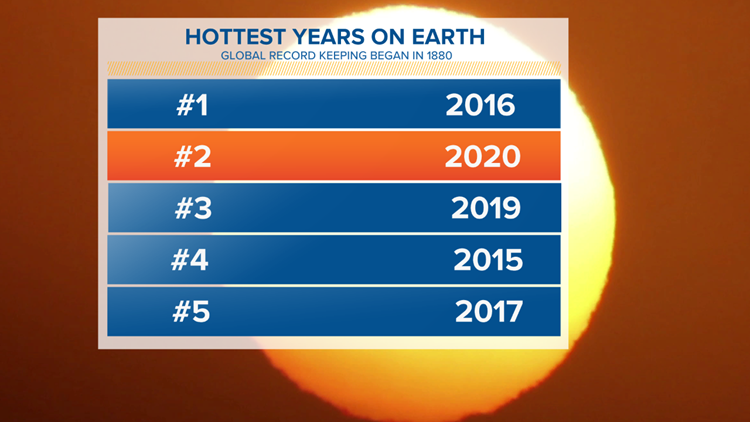BUFFALO, N.Y. — Yes, 2020 was the second hottest year on record for the Earth, nearly tying for first place with 2016 too.
In an official bulletin released Thursday, the National Oceanic and Atmospheric Administration (NOAA) and National Centers for Environmental Information (NCEI) released their final findings from this past year. 2020's average land and ocean surface temperature was 1.76 degrees (Fahrenheit) above average, only 0.04 degrees behind 2016's global average of 1.80 degrees. But the Northern Hemisphere alone had its hottest year on record.
A few notable shifts in the planet's climate in 2020 can be shown through the lack of Arctic and Antarctic Sea ice, sparse Northern Hemisphere snow cover, and global number of tropical cyclones. As for the United States itself, both the record number of tropical cyclones during the Atlantic hurricane season and billion dollar disasters across the United States also demonstrate Earth's changing climate.
In particular, the fact that there was as active of a hurricane season was due to an emerging La Niña. A La Niña also signals cooling sea surface temperatures in the equatorial Pacific Ocean. What's interesting to note is that this global ocean to air phenomenon can typically shift local climates to experience cooler-than-average conditions, and 2020 was still one of the warmest years on record regardless.
As for Western New York, the yearly average temperature for 2020 was 49.7 degrees. While this doesn't make it into the top 10 warmest years on record locally, five months out of the year did for their individual months.
January 2020 was the ninth warmest, March 2020 was the seventh warmest, August 2020 was the fifth warmest, November 2020 was the sixth warmest, and July 2020 was the warmest July and month on record for Buffalo. July 2020 also included a record warm streak of consecutive, 90-plus-degree days, which included the warmest temperature recorded in the city in 67 years (98 degrees).
So even what Buffalo experienced in 2020 echoes the warming trend that occurred this past year across the globe. NOAA scientists at NCEI also predict that future years will follow suit in ranking in the top 10 warmest globally, though they acknowledge fluctuations caused by natural variability could impact this warming trend on a yearly basis.



